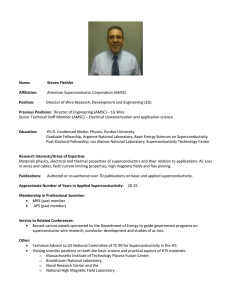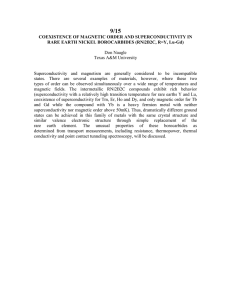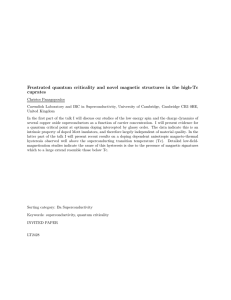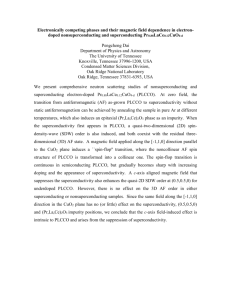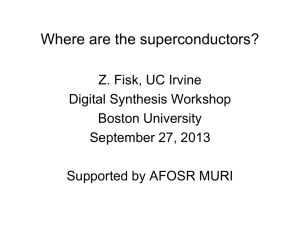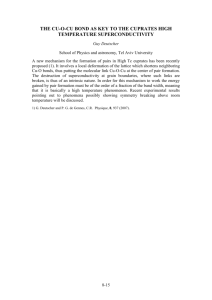reading list for superconductivity
advertisement
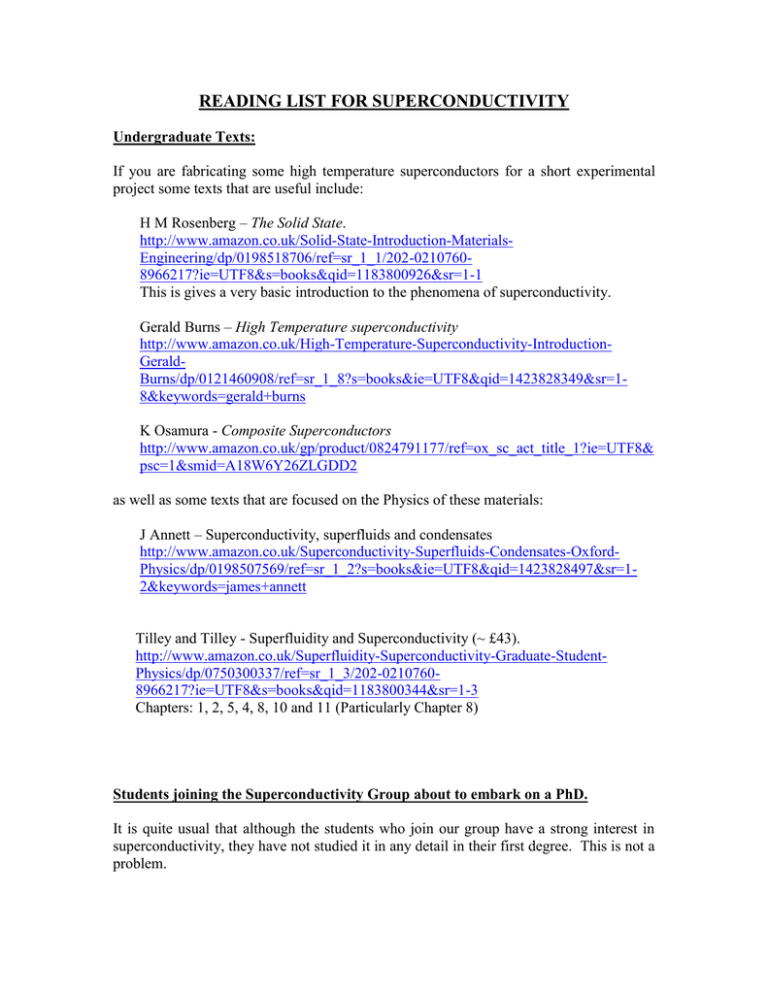
READING LIST FOR SUPERCONDUCTIVITY Undergraduate Texts: If you are fabricating some high temperature superconductors for a short experimental project some texts that are useful include: H M Rosenberg – The Solid State. http://www.amazon.co.uk/Solid-State-Introduction-MaterialsEngineering/dp/0198518706/ref=sr_1_1/202-02107608966217?ie=UTF8&s=books&qid=1183800926&sr=1-1 This is gives a very basic introduction to the phenomena of superconductivity. Gerald Burns – High Temperature superconductivity http://www.amazon.co.uk/High-Temperature-Superconductivity-IntroductionGeraldBurns/dp/0121460908/ref=sr_1_8?s=books&ie=UTF8&qid=1423828349&sr=18&keywords=gerald+burns K Osamura - Composite Superconductors http://www.amazon.co.uk/gp/product/0824791177/ref=ox_sc_act_title_1?ie=UTF8& psc=1&smid=A18W6Y26ZLGDD2 as well as some texts that are focused on the Physics of these materials: J Annett – Superconductivity, superfluids and condensates http://www.amazon.co.uk/Superconductivity-Superfluids-Condensates-OxfordPhysics/dp/0198507569/ref=sr_1_2?s=books&ie=UTF8&qid=1423828497&sr=12&keywords=james+annett Tilley and Tilley - Superfluidity and Superconductivity (~ £43). http://www.amazon.co.uk/Superfluidity-Superconductivity-Graduate-StudentPhysics/dp/0750300337/ref=sr_1_3/202-02107608966217?ie=UTF8&s=books&qid=1183800344&sr=1-3 Chapters: 1, 2, 5, 4, 8, 10 and 11 (Particularly Chapter 8) Students joining the Superconductivity Group about to embark on a PhD. It is quite usual that although the students who join our group have a strong interest in superconductivity, they have not studied it in any detail in their first degree. This is not a problem. If you are new to superconductivity, take advice about how where to start your reading. As a very accessible introduction to the language you will need to know and as a description of how the superconductivity research community is in full flight, you can start with: Rise of Superconductors – by Ford and Saunders CRC press http://www.amazon.co.uk/gp/offerlisting/0748407723/ref=sr_1_olp_1?ie=UTF8&s=books&qid=1258112930&sr=1-1 For post-graduates joining the Superconductivity Group in Durham that are starting an advanced degree in Physics, you can begin with: C P Poole, H A Farach and R J Creswick, Superconductivity (Academic Press Inc, San Diego, California, 1995 (~ £40) http://www.amazon.co.uk/Superconductivity-Charles-PPoole/dp/012561456X/ref=sr_1_3/202-02107608966217?ie=UTF8&s=books&qid=1183800021&sr=1-3 There are some research papers you should try to read in parallel. S A Keys and D P Hampshire - Measurement and Interpretation of Electromagnetic Properties - Characterisation of conductors. Review 42 pages Handbook of Superconducting Materials, Pub: Institute of Physics, Editors D Cardwell and G Ginley (2002) D Wood V Greener and D P Hampshire - Oxygen drips upwards from superconductors. Nature (brief communications) 415 860 (2002). D. M. J. Taylor and Damian P. Hampshire - The scaling law for the strain-dependence of the critical current density in Nb3Sn superconducting wires - Supercond. Sci. Tech 18 (2005) S241-S252 H J Niu and D P Hampshire - Disordered Nanocrystalline Superconducting PbMo6S8 with a Very Large Upper Critical Field. Phys. Rev. Lett 91 027002 (2003) - also published in: Virtual Journal of Applications of Superconductivity, July 15, Vol. 5 2003 and Virtual Journal of Nanoscale Science & Technology, July 21, Vol 8 2003 and possibly: N R Leigh and D P Hampshire - Deriving the Ginzburg-Landau parameter from heat capacity data on magnetic superconductors with Schottky anomalies. Phys. Rev. B. 68 174508(2003) G. J. Carty and Damian P. Hampshire - Numerical studies on the effect of normal-metal coatings on the magnetization characteristics of type-II superconductors - Phys. Rev. B. 71 (2005) 144507 - also published in the May 1st, 2005 edition of the Virtual Journal of Applications of Superconductivity. ………………………………………………………………………………….. Then read through selected chapters from the textbooks below: i) Tilley and Tilley - Superfluidity and Superconductivity (~ £43). http://www.amazon.co.uk/Superfluidity-Superconductivity-Graduate-StudentPhysics/dp/0750300337/ref=sr_1_3/202-02107608966217?ie=UTF8&s=books&qid=1183800344&sr=1-3 Chapters: 1, 2, 5, 4, 8, 10 and 11 (Particularly Chapter 8) ii) M N Wilson, Superconducting Magnets (Oxford University Press, 1986) (~ £24) http://www.amazon.co.uk/Superconducting-Magnets-Monographs-CryogenicsMartin/dp/0198548109/ref=sr_1_1/202-02107608966217?ie=UTF8&s=books&qid=1183800498&sr=1-1 Chapters: 1, 2, 10, 11, 12, 13. (Particularly Chapter 12) …………………………………………………………………………… If you joining us with an interest in a joint Engineering-Physics PhD in a collaboration with our group, then take advice about focused reading but you may consider: AC and DC power transmission-Caracino Pirelli.pdf Applied properties of s-c materials -Masur Amer Supercon.pdf Current leads - Ryan OI.pdf Electromagnets - Jones Oxf.pdf Energy storage - Blaugher NREL CO.pdf Fault-current limiters - Giese Argonne+Naperville.pdf Intro processing - Murakami+Flukiger.pdf MgB2 - Buzea Canada+Tohoku.pdf Phase diagrams - Shercliffe+Ashby Camb.pdf Processing LTC conductors - Nb3Sn - Miyazaki Kobe Steel.pdf Refrigeration methods - Radebaugh NIST.pdf Transformers - McConnell ORNL.pdf YBCO - K-B+Murakami ISTEC.pdf …………………………………………………….. After you have joined the group, we have a copy of: Experimental techniques for low-temperature measurements – J W Ekin (~£40). http://www.amazon.co.uk/gp/offer-listing/0198570546/ref=sr_1_olp_1/202-02107608966217?ie=UTF8&s=books&qid=1183801912&sr=1-1 During the first year, you should read chapters 1,3, 4, 5, 9 and 10. Do remember that the British Ph.D is short – typically ~ 3 ½ - 4 years. Our aim is to successfully build a world-class research team that produces publications at the cuttingedge of science. After you join our group (typically in October), as an experimentalist you should try to spend at least half your time doing experiments in the laboratory (The reading is lower priority than getting your experiments underway. Experience shows that your reading is far better focused and retained when you have to analyse your data for publication). The other priorities for new members of the group are passing the post-graduate exams after Christmas, completing your first-year report in July and passing your English language exam (if necessary). While reading, start to collate the following chapters for your first year report: Chapter 2 : Basic Superconductivity: 1) Ginzburg-Landau theory < 4 pages 2) BCS Superconductors < 4 pages. Superconductivity text books: You do not need to buy text-books for your research. If you wish to buy a text book for the group, please send me a purchase order. When the book arrives simply write “Superconductivity Group” and the date on the inside of the front cover – store it on the group book shelf when you are not using it. There are some other excellent texts that can also be very useful: Excellent books for students new to Superconductivity C P Poole, H A Farach and R J Creswick, Superconductivity (Academic Press Inc, San Diego, California, 1995) Excellent books for more established post-graduates in superconductivity M Tinkham, Introduction to Superconductivity (McGraw-Hill Book Co., Singapore, 1996) C P Poole, Handbook of superconductivity (Academic press, 2000) M N Wilson, Superconducting Magnets (Oxford University Press, 1986) J B Ketterson and S N Song, Superconductivity (Cambridge University Press, 1999) J R Waldram, Superconductivity of Metals and Cuprates (IOP Publishing Ltd., London, 1996) Excellent Books for G-L theory P G De Gennes, Superconductivity of Metals and Alloys (Addison Wesley Publishing Company, Redwood City, California, 1989) D R Tilley and J Tilley, Superfluidity and Superconductivity (IOP publishing Ltd., Bristol, 1990) Excellent Reference Books: D Cardwell and D Ginley, Handbook of Superconducting Materials (IOP, Bristol, 2003) B Seeber, Handbook of Applied Superconductivity (Institute of Physics, Bristol, 1998) E M Landau, I M Lifshitz and L P Pitaevskii, Electrodynamics of Continuous Media (Butterworth Heinneman, 1960) E Landau, E Lifshitz and L Pitaevskii, Electrodynamics of Continuous Media (Butterworth Heinneman, 2002) J D Jackson, Classical Electrodynamics (John Wiley and Sons, New York, 1999) G Woan, (CUP, Cambridge, 2003) A B Pippard The elements of Classical Thermodynamics (CUP, Cambridge, 1964)
